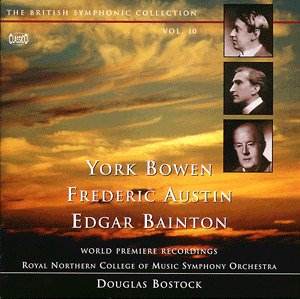This CD, packed to the gunwhales, is an answer to those
of us who have berated the companies for constant reploughing of the
same repertoire. Here are three world premiere recordings casting shafts
of light on British music in the periods just before and just after
the Great War - an event that made and unmade the reputations of so
many composers.
Bowen's Second (of three; there is talk of a
Fourth but nothing survives) is a work of Tchaikovskian tendencies.
It is rolling and positive rather than neurosis-ridden. It might well
be thought of as a counterpart to the better Glazunov symphonies such
as the Fourth and Fifth and to Tchaikovsky's Hamlet and Tempest.
Its themes - especially in the first movement - have a touch of both
Grainger and Delius. The first movement begins with a barked out motto
theme. The work was favoured by the conductor Landon Ronald, an early
champion of Rachmaninov's Second Symphony.
Frederic Austin's fancy must have been taken
by Frank Bridge's earlier works such as The Sea as well as by
the earlier tone poems of Richard Strauss. His Spring is voluptuous
music without the profusion of layers Strauss would have added. As a
result the textures remain transparent and the effect clear. This vernal
rhapsody has something in common with Bax's Spring Fire (though
it is not as iconoclastically impressionistic) and Happy Forest.
Lastly comes Edgar Bainton's twenty minute,
purely orchestral, prelude (entitled Genesis) to his choral symphony
Before Sunrise. The Symphony sets words by Swinburne whose 'Atalanta
in Calydon' also prompted Bax's Spring Fire symphony. Bainton
was to write four symphonies of which this was the (unnumbered) second.
The visionary-angry impressionism of the Third (a work of the early
1950s) regrettably remains a closed book to those who do not have access
to the primitive Brolga LP of the Australian premiere.
While the other pieces were completely unknown to me
as a listening experience Genesis had been broadcast by the BBC in
1995 in a studio version by the BBC Concert Orchestra. This version
easily outstrips that dutiful and rather muddy off-air tape. The work
certainly emerges as a more rugged and impressive work than hitherto
without having the mastery of the Second and Third Symphonies; the former
recorded on Chandos.
Genesis starts amid the sort of gloomy introspection
favoured by Scriabin and Miaskovsky and by Rachmaninov in his Isle
of the Dead. Even the allegro section at about 12.12 sounds
somewhat like the scherzo of Scriabin's First Symphony leading
into a screwing up of cataclysmic tension. This will leave you wanting
to hear the rest of the work.
This issue paves the way for a new generation of British
recording premieres. There are the piano concertos by Holbrooke (numbers
2 and 3 stand in waiting), Bowen (4) and Coke (6), Austin's one and
only symphony, Coke's three and Baines' single symphony not to mention
the first three symphonies (pre-Great War) of Joseph Holbrooke. I hope
that Douglas Bostock and the RNCM might be interested enough in these
projects to develop them. Until then these three works offer pleasure
and revelation.
Rob Barnett
See also review by Raymond
Walker


